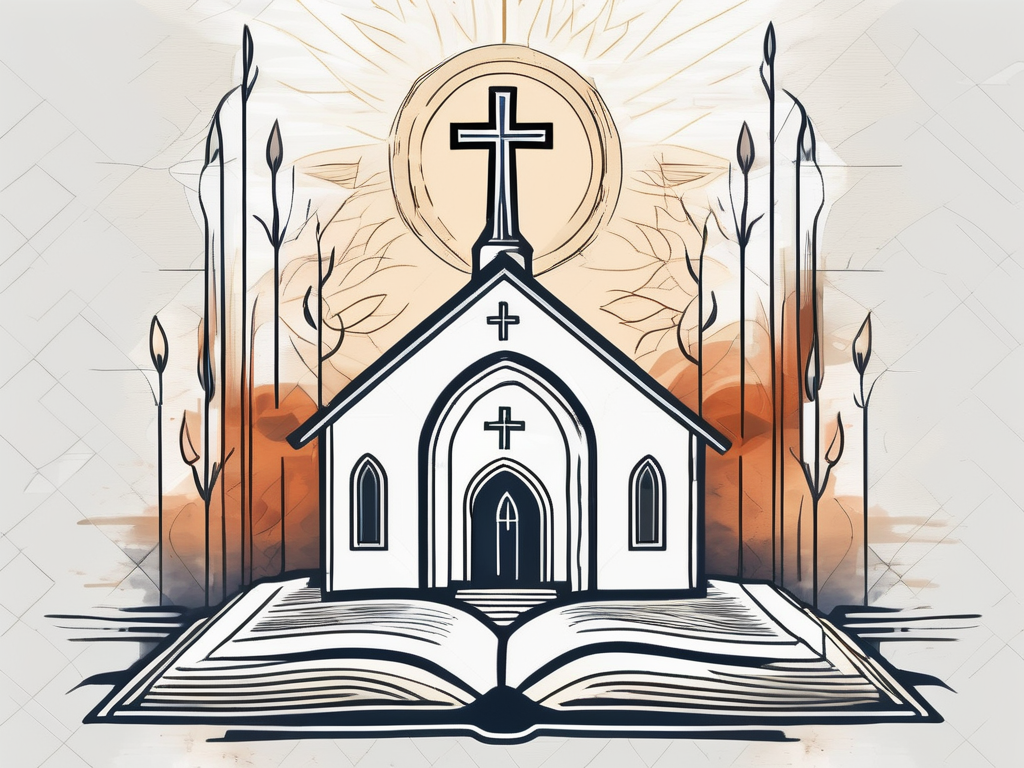The United Church of Christ (UCC) may not be as well-known as some other Christian denominations, but its beliefs and principles are just as profound. In this article, we will explore the key aspects of the UCC’s faith, its theological beliefs, stance on social issues, worship practices, and its role in contemporary society. By the end, you’ll have a greater understanding of what the United Church of Christ believes and stands for.
Understanding the United Church of Christ
Before delving into the specifics, it’s essential to have a basic understanding of what the United Church of Christ is all about. The UCC is a Protestant denomination that was formed in 1957 as a merger of four different Christian traditions. It prides itself on being a “united and uniting” church that values diversity and inclusivity.
The United Church of Christ has a rich and fascinating history that dates back to the early days of the Pilgrims who arrived in the New World seeking religious freedom. These early settlers laid the foundation for the faith community that would eventually become the UCC. Over the centuries, various Christian denominations merged and evolved to form the United Church of Christ as it is known today.
One of the key moments in the history of the UCC was the merger of the Congregational Christian Churches and the Evangelical and Reformed Church in 1957. This merger brought together two distinct traditions and created a new denomination that would embrace both their strengths and shared values.
Throughout its history, the United Church of Christ has been a trailblazer in promoting social justice and equality. The UCC played a significant role in the civil rights movement, advocating for racial equality and supporting the efforts of activists such as Martin Luther King Jr. Today, the UCC continues to be at the forefront of social justice issues, advocating for LGBTQ+ rights, gender equality, and environmental stewardship.
Origins and History of the United Church of Christ
The UCC traces its roots back to the Pilgrims who arrived in the New World seeking religious freedom. These early settlers, who were part of the Congregationalist tradition, established the first churches in what would become the United States. Their commitment to religious freedom and their belief in the autonomy of individual churches laid the groundwork for the United Church of Christ.
Over the centuries, the Congregationalist tradition continued to grow and evolve. It spread throughout New England and beyond, with churches being established in various parts of the country. These churches were known for their emphasis on community and their commitment to social justice.
In the early 20th century, the Congregationalist tradition merged with the Christian Church, a denomination with roots in the Reformed tradition. This merger brought together two distinct traditions and created a new denomination known as the Congregational Christian Churches.
In 1957, the Congregational Christian Churches merged with the Evangelical and Reformed Church to form the United Church of Christ. This merger was a significant moment in the history of the UCC, as it brought together two distinct traditions and created a new denomination that would embrace both their strengths and shared values.
Since its formation, the United Church of Christ has continued to grow and adapt to the changing needs of its members. The UCC has been at the forefront of many social justice movements, advocating for equality and justice for all people. Today, the UCC is a diverse and inclusive denomination that welcomes people from all walks of life.
Key Principles and Beliefs
At the core of UCC’s beliefs are four key principles: unity, equality, freedom, and responsibility. These principles guide the UCC’s approach to faith and inform its commitment to social justice.
Unity is a central value of the UCC. The UCC believes in the interconnectedness of all people within the body of Christ. It emphasizes the importance of community and the belief that all individuals are part of a larger whole.
Equality is another fundamental principle of the UCC. The UCC is committed to justice and acceptance of all individuals, regardless of their background. The UCC believes that all people are created in the image of God and should be treated with dignity and respect.
Freedom is a core value of the UCC. The UCC believes in the autonomy of individual churches to make decisions based on their unique circumstances. This belief in freedom extends to individuals as well, as the UCC encourages its members to explore their own faith journeys and ask questions.
Responsibility is a key principle that guides the UCC’s commitment to social justice. The UCC believes that it has a responsibility to care for the marginalized and work towards a more just and equitable society. This commitment to responsibility is reflected in the UCC’s advocacy work and its efforts to address issues such as poverty, racism, and environmental justice.
Theological Beliefs of the United Church of Christ
Now that we have a foundation for understanding the UCC, let’s explore its theological beliefs. The UCC has an open and progressive theological orientation that encourages intellectual inquiry and personal exploration of faith.
The United Church of Christ (UCC) is a denomination that embraces a wide range of theological perspectives within its congregations. While the UCC does not have a specific creed or set of beliefs that all members must adhere to, there are some common theological themes that are prevalent throughout the denomination.
One of the key beliefs of the UCC is that God is revealed through the life and teachings of Jesus Christ. Jesus is seen as the embodiment of God’s love and grace, and his life serves as a model for how believers should live and interact with the world. The UCC affirms Jesus as the cornerstone of their faith, but also acknowledges the value and validity of other religious traditions. This inclusive approach is reflective of the UCC’s commitment to interfaith dialogue and understanding.
In addition to their beliefs about God and Jesus Christ, the UCC also holds certain beliefs about the Holy Spirit and salvation. The UCC acknowledges the presence of the Holy Spirit in the lives of believers, guiding and empowering them for a life of discipleship. The Holy Spirit is seen as the source of inspiration and transformation, working within individuals and communities to bring about God’s kingdom on earth.
Furthermore, the UCC believes in the extravagant grace of God, affirming that salvation is a free gift available to all who accept it. This understanding of salvation is rooted in the belief that no one is beyond God’s love and reconciliation. The UCC rejects the notion of predestination and emphasizes the importance of personal choice and responsibility in accepting God’s grace.
Within the UCC, there is a wide range of theological perspectives and interpretations of scripture. Some congregations may lean more towards conservative or traditional beliefs, while others may embrace more liberal or progressive views. This diversity of thought is celebrated within the UCC, as it encourages intellectual inquiry and personal exploration of faith.
Overall, the UCC’s theological beliefs are characterized by a commitment to inclusivity, social justice, and the pursuit of truth. The denomination encourages its members to engage in thoughtful dialogue and to continually seek a deeper understanding of God and the world. This commitment to intellectual exploration and open-mindedness is what sets the UCC apart and makes it a unique and vibrant denomination within the Christian tradition.
The United Church of Christ and Social Issues
The United Church of Christ (UCC) has a long-standing tradition of being at the forefront of social justice movements. Its commitment to equality and justice is evident in its stance on various social issues.
Founded in 1957, the UCC is a Protestant Christian denomination that believes in the power of love and inclusivity. It strives to create a world where all individuals are treated with dignity and respect, regardless of their background or identity.
Stance on Human Rights and Equality
One of the core values of the UCC is its unwavering commitment to human rights and equality. The UCC actively advocates for LGBTQ+ rights, racial justice, gender equality, and the rights of marginalized communities. It believes that all individuals are created in the image of God and should be treated with love, dignity, and respect.
The UCC’s commitment to LGBTQ+ rights is reflected in its support for marriage equality and its affirmation of the full inclusion of LGBTQ+ individuals in the life of the church. The denomination has been a strong advocate for the rights of LGBTQ+ individuals to marry and adopt children, and it has actively worked to combat discrimination and promote acceptance within its congregations.
In the realm of racial justice, the UCC has been actively involved in addressing systemic racism and promoting racial reconciliation. It has supported initiatives such as criminal justice reform, voting rights, and economic equality for marginalized communities. The UCC recognizes that racial justice is not just an issue of individual attitudes, but also a systemic problem that requires collective action and advocacy.
Gender equality is another important issue for the UCC. The denomination has been a vocal advocate for women’s rights, including reproductive rights, equal pay, and leadership opportunities within the church. It believes that gender should never be a barrier to full participation and leadership in all aspects of life.
Environmental Advocacy and Stewardship
The UCC recognizes the importance of environmental stewardship and is committed to being caretakers of God’s creation. The denomination actively promotes sustainable practices and encourages its members to take responsibility for the well-being of the planet.
From reducing carbon footprints to advocating for renewable energy, the UCC emphasizes the interconnectedness of the environment and the well-being of humanity. It believes that caring for the earth is not only a moral imperative but also a way to ensure a sustainable future for generations to come.
The UCC’s commitment to environmental advocacy is reflected in its support for policies that address climate change, protect natural resources, and promote environmental justice. The denomination has been involved in grassroots movements, lobbying efforts, and educational initiatives to raise awareness about the importance of environmental stewardship.
Furthermore, the UCC encourages its members to engage in sustainable practices in their daily lives. It provides resources and guidance on energy conservation, waste reduction, and sustainable food choices. The UCC believes that individual actions, when combined with collective efforts, can make a significant impact on the health of the planet.
In conclusion, the United Church of Christ’s commitment to social justice extends to a wide range of issues, including human rights, equality, and environmental advocacy. Through its actions and advocacy, the UCC strives to create a more just and inclusive society, guided by the principles of love, compassion, and respect for all.
Worship and Practices in the United Church of Christ
Worship and practices play a vital role in the life of any faith community, and the UCC is no exception. Let’s explore some key aspects of UCC worship and practices.
Sacraments and Rituals
The UCC celebrates two sacraments—baptism and communion. Baptism is a significant milestone symbolizing initiation into the Christian faith. Communion, also known as the Eucharist or the Lord’s Supper, is a sacred act of remembrance and spiritual nourishment. In addition to these sacraments, the UCC also incorporates various rituals and liturgical practices to enhance worship experiences.
Community Life and Fellowship
The UCC places a strong emphasis on community and fellowship. Churches within the UCC often cultivate a sense of belonging and inclusivity through activities such as small group gatherings, community service projects, and shared meals. This sense of community helps foster spiritual growth, provides support in difficult times, and allows for deeper connections among members.
The United Church of Christ Today
As with any faith tradition, the United Church of Christ must navigate modern challenges and grapple with contemporary controversies.
Modern Challenges and Controversies
The UCC faces various challenges in today’s rapidly changing world. Some of these challenges include declining membership, adapting to digital technologies, and addressing theological differences within the denomination. However, the UCC remains committed to engaging with these challenges thoughtfully and seeks to find ways to promote its message of love, justice, and inclusivity in today’s society.
The Church’s Role in Contemporary Society
The United Church of Christ continues to strive for a prominent role in contemporary society. It actively engages in social and political issues, advocating for justice, peace, and equality. The UCC believes that the church should be a transformative force in society, challenging unjust structures and working towards a more inclusive and compassionate world.
In conclusion, the United Church of Christ holds a set of beliefs that emphasize unity, equality, freedom, and responsibility. With a progressive approach to theology and a commitment to social justice, the UCC actively engages with the world to promote love, acceptance, and advocacy for the voiceless. Whether through worship practices or tackling contemporary challenges, the UCC aims to embody the teachings and life of Jesus Christ in all aspects of its faith community.












